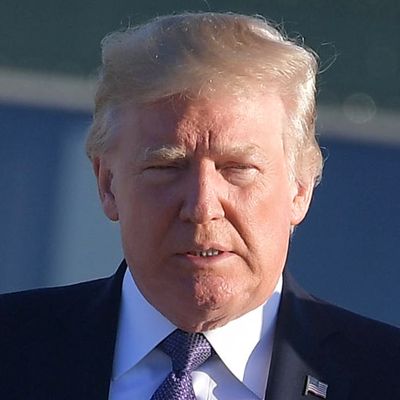
The Wall Street Journal reported on Saturday that, according to a senior administration official, President Trump is preparing to sign an executive order this week that could significantly weaken the Affordable Care Act. The order is not a done deal yet, but reports from other outlets have surfaced similar details about its specifics.
According to the Journal, Trump will mandate the departments of Health and Human Services, Labor, and Treasury to make it easier for people to sign onto health-care plans that are skimpier than what Obamacare currently allows, circumventing rules laid out by Congress when it passed the law in 2010.
As part of the executive order, Trump will exempt “association plans” from the strictures of the Affordable Care Act. This means that small businesses will be able band together to buy insurance coverage as a group, allowing them to negotiate lower prices and premiums for employees. But it also means that the health-care plans they purchase are not required to cover essential health benefits like preexisting conditions, maternity care, and other basics of Obamacare. When the Affordable Care Act passed, association plans were classified as small businesses and became subject to the same, stricter coverage rules as larger corporations.
The Trump administration may also allow individuals to use this loophole, which could be an attractive choice for young, healthy consumers who want to pay lower premiums for more bare-bones coverage than the Affordable Care Act allows. But if such consumers peel off from the current individual markets, the Obamacare markets would be left with a preponderance of old and sick people, resulting in the “death spiral” that has long been breathlessly predicted by Republicans — but which has not yet come to pass.
Trump will also allow insurers to offer “short-term medical insurance,” a low-cost option that had been restricted by the Obama administration, to be made available to consumers for up to a year, as opposed to the current three months. He will expand “health reimbursement accounts,” which employees use to pay for out-of-pocket expenses. And he will allow individuals to buy insurance across state lines.
All of these measures are seen by health-care experts as having the potential to damage significantly the already fragile Obamacare individual markets, which depend on a mix of healthy and infirm enrollees.
“This appears to be a backdoor way of undermining the Affordable Care Act,” Kevin Lucia, a professor at Georgetown’s Health Policy Institute, told Vox.
The order is sure to face court challenges from states that would prefer to keep their Obamacare markets as they are.
The new rules have been favored by many Republicans for years, and the executive order appears to be, at least in part, the brainchild of Kentucky senator Rand Paul, who has criticized past Obamacare repeal efforts for not going far enough. The Journal reports that Paul has been working with Trump for months.
Andy Slavitt, who led the Centers for Medicare and Medicaid from 2015 to 2017 and has become an influential advocate for protecting the Affordable Care Act, has labeled the executive part of “synthetic repeal” a multi-pronged approach to undermining Obamacare in lieu of repeal legislation.
Even before the executive order, the Trump administration has been busy sabotaging the law from the inside. It has drastically cut the budget for outreach, made Healthcare.gov inaccessible at key times, and prevented even conservative measures to stabilize state markets, among other measures.
But Trump has not given up on congressional repeal just yet.
At a fundraiser in North Carolina Saturday night, the president told a group of wealthy, restive donors that he was still committed to repeal, though he acknowledged it was a steep climb. He also discussed his unexpected phone call to Chuck Schumer on Friday, in which he discussed a possible deal with Democrats on health care. The New York senator said he told Trump on Friday that he needed to stop sabotaging the law before Democrats would come to the bargaining table.
Whether Trump is serious about a bipartisan effort, or just wants to spook his fellow Republicans, remains to be seen. But if the reported executive order comes to pass, it would be another sign that the president’s burning desire to roll back his predecessor’s achievements supersedes his desire to improve Americans’ health care.






























